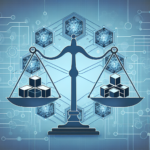Understanding Traditional Blockchain
What is Traditional Blockchain?
Traditional blockchain is a decentralized ledger technology that records transactions across many computers so that the recorded transactions cannot be altered retroactively. This attribute ensures high security and transparency. Bitcoin, Ethereum, and many cryptocurrencies utilize traditional blockchain for their operations, each offering distinct features and functionalities.
Key Features of Traditional Blockchain
1. Decentralization
One of the hallmark features of traditional blockchain is its decentralized nature. Instead of relying on a single entity, the control is distributed among network participants. This means no single point of failure and reduced risk of censorship or fraud.
2. Transparency
All transactions recorded on a traditional blockchain are visible to all network participants. This transparency fosters trust among participants since everyone can verify each transaction independently.
3. Immutability
Once data is recorded in a traditional blockchain, modifying it is nearly impossible. This immutability is achieved through cryptographic hash functions, ensuring data integrity and historical accuracy.
The Shift Toward Quantum Computing
What is Quantum Computing?
Quantum computing is a revolutionary technology that leverages the principles of quantum mechanics to perform computations. Unlike classical computers, which use bits as the smallest unit of data, quantum computers use qubits. These qubits can exist in multiple states simultaneously, allowing quantum computers to solve certain problems much faster than classical computers.
Potential Impacts of Quantum Computing on Blockchain
1. Cryptography Vulnerabilities
The security of traditional blockchains heavily relies on cryptographic techniques such as RSA and ECC (Elliptic Curve Cryptography). Quantum computers have the potential to break these cryptographic systems exponentially faster than classical computers can. This poses a significant threat to the integrity of blockchain technology, as it could allow malicious actors to forge transactions and compromise user security.
2. Speed and Efficiency
A major advantage of quantum computing is its ability to process complex calculations in a fraction of the time it takes classical computers. This capability could lead to faster transaction processing in blockchain networks. However, it could also introduce challenges, particularly concerning network consensus and the verification of transactions.
Introducing Quantum Blockchain
What is Quantum Blockchain?
Quantum blockchain integrates principles of quantum computing with traditional blockchain to enhance security and efficiency. While still in its early development phases, the concept revolves around utilizing quantum cryptography to bolster the integrity and security of blockchain networks.
Key Features of Quantum Blockchain
1. Quantum Cryptography
Quantum blockchain employs quantum key distribution (QKD) to enable secure communication. QKD allows two parties to generate a shared encryption key that is secure against any computational attacks, including those from quantum computers. This fundamentally shifts how we approach blockchain security, making it far more resilient to breaches.
2. Enhanced Security Protocols
Quantum blockchains can introduce protocols that would be infeasible for traditional blockchains. For instance, they might rely on quantum entanglement and teleportation to create near-invulnerable transaction methods, effectively eliminating the risk of double-spending and fraud.
Comparative Analysis: Traditional Blockchain vs. Quantum Blockchain
Scalability
Traditional Blockchain Scalability Challenges
Traditional blockchains often face issues with scalability, especially during peak transaction times. Processing transactions can become slow, leading to higher fees and longer waiting times. Many solutions have been proposed, like layer-2 scaling options, but these have not fully resolved the speed limitations.
Quantum Blockchain Scalability Solutions
Quantum blockchain could potentially overcome some of these scalability issues. By enabling more efficient computing and offering faster transaction verification, quantum systems may allow blockchains to scale more effectively without compromising speed.
Security
Security in Traditional Blockchain
The security of traditional blockchain relies primarily on cryptographic methods. While currently robust, it may not withstand the threats posed by advanced quantum computing.
Quantum Blockchain Security Advantages
Quantum blockchain offers a more secure solution by employing quantum cryptographic techniques that are theoretically impervious to attacks from quantum computers. It would make hacking or altering transaction records extremely difficult, if not impossible.
Adoption and Maturity
Maturity of Traditional Blockchain
Traditional blockchain technology is relatively mature, with established applications across multiple industries, including finance, supply chain, healthcare, and beyond. The community has developed numerous smart contracts, decentralized applications, and other innovations.
Emergence of Quantum Blockchain
Quantum blockchain, however, is still in its infancy. While it holds great promise, there is still much research and development needed before it can be widely adopted. Its real-world applications, regulatory acceptance, and community support are still being explored.
Industry Relevance and Future Trends
Current Use Cases of Traditional Blockchain
From facilitating cryptocurrency transactions to enabling smart contracts and decentralized applications, traditional blockchain has various applications. Industries like finance, logistics, and even voting systems are benefitting from this technology.
Potential Use Cases for Quantum Blockchain
Quantum blockchain could open new opportunities across multiple sectors. Industries may harness its security for sensitive data transactions, secure voting systems, supply chain verifications, and more, potentially revolutionizing how data integrity is maintained.
Challenges Ahead
Technical Challenges of Quantum Blockchain
While quantum blockchain has undeniable potential, it faces technical challenges, including the need for more profound understandings of quantum mechanics, the development of new protocols, and the mitigation of issues like quantum noise and error rates.
Regulatory and Adoption Challenges
As with any emerging technology, quantum blockchain will face regulatory hurdles. Ensuring compliance with existing laws and frameworks while navigating the uncertainties of new technological capabilities is a complex prospect that will require careful consideration and collaboration among stakeholders.
Bridging the Gap Between Blockchain Technologies
The Path Forward
To successfully transition from traditional blockchain to quantum blockchain, it will be critical to cultivate an ecosystem that encourages collaboration between blockchain developers, quantum researchers, and regulatory bodies. Building robust frameworks that incorporate the best of both worlds can lead to a more secure and efficient blockchain environment, benefitting industries and consumers alike.
Community Engagement and Research
Ultimately, the evolution of blockchain technology, whether traditional or quantum, revolves around community support and innovative research. By actively engaging in discussions, collaboration, and experimental projects, the industry can navigate the challenges and harness the vast potential of these foundational technologies.









